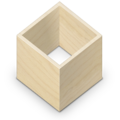Flatpak
 | |
| Developer(s) | Alex Larsson, Flatpak Team |
|---|---|
| Stable release | 0.9.6
|
| Repository | |
| Written in | C |
| Operating system | Linux |
| Type | Application virtualization |
| License | LGPL[1] |
| Website | flatpak |
Flatpak (formerly xdg-app) is a software utility for software deployment, package management, and application virtualization for Linux desktop computers. It provides a sandbox environment in which users can run applications in isolation from the rest of the system.[2][3] Applications using Flatpak need permission from the user to control hardware devices or access the user's files.[4]
The idea was first proposed in 2013 by Lennart Poettering,[3] who published an article about it in 2014.[5][6] Developed as part of the freedesktop.org project (formerly known as X Desktop Group or XDG),[7] it was originally called xdg-app.[8]
As of February 2017[update], some popular apps available as Flatpaks include Blender, Skype, Spotify, LibreOffice,[9] Pitivi,[10] KDE Applications[11] and development versions of Mozilla Firefox.[12]
See also
References
- ^ "LGPL". xdg-app repository. freedesktop.org. Retrieved 2016-11-21.
{{cite web}}: Italic or bold markup not allowed in:|website=(help) - ^ Larsson, Alexander (29 April 2016). "Using bubblewrap in xdg-app". Alexander Larsson: Cool links and commentary. GNOME. Retrieved 8 January 2016.
- ^ a b Willis, Nathan (2015-01-21). "GNOME and application sandboxing revisted". LWN. Retrieved 2016-01-03.
- ^ Willis, Nathan (2015-08-12). "Working with xdg-app application bundles". LWN. Retrieved 2016-01-03.
- ^ corbet (1 September 2014). "Poettering: Revisiting how we put together Linux systems". LWN. Retrieved 2016-10-31.
- ^ Poettering, Lennart (1 September 2014). "Revisiting How We Put Together Linux Systems". Pid Eins.
- ^ "Flatpak - the future of application distribution". Retrieved 2016-12-16.
- ^ Larsson, Alexander (9 May 2016). "Renamed to flatpak in git". freedesktop.org. Retrieved 1 June 2016.
- ^ "LibreOffice in Flatpak format". LibreOffice. Retrieved 1 June 2016.
- ^ "Pitivi-download". Pitivi. Retrieved 1 July 2016.
- ^ "kde-applications". KDE Flatpak. Retrieved 1 March 2017.
- ^ "Unofficial Firefox Developer Edition flatpak repository". Unofficial Firefox Developer Edition flatpak repository. Retrieved 20 March 2017.

